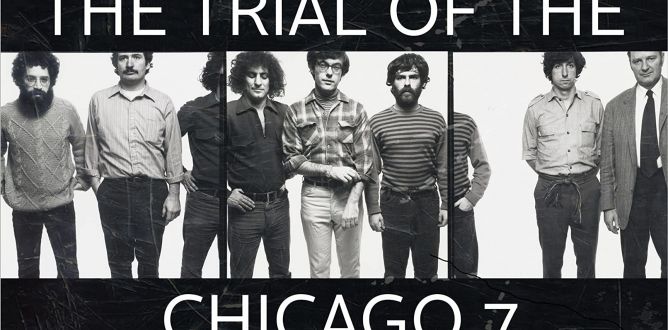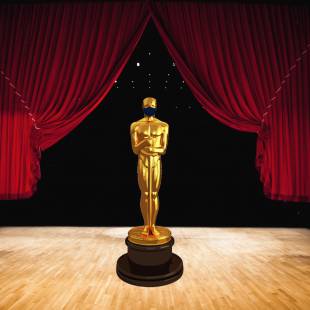The Trial of the Chicago 7 Parent Guide
The most terrifying part of this movie is its contemporary relevance.
Parent Movie Review
It’s September 24th, 1969, the opening day of one of the most specular trials in American history. Crowds throng the courthouse steps, waving placards and chanting, “The whole world is watching.” And this trial gives everyone a whole lot to see.
Heading into the courtroom are the men known as the Chicago 8, all of whom were arrested in conjunction with the riots outside of the Democratic National Convention in the summer of 1968. The defendants, all anti-war activists, have been charged (for the first time in American history) with conspiring to cross state lines to incite violence. Now appearing in court are Tom Hayden, Abbie Hoffman, Rennie Davis, Jerry Rubin, David Dellinger, Lee Weiner, John Froines, and Bobby Seale (whose trial would be severed from the other defendants, bringing the group down to seven). Director Aaron Sorkin hit the jackpot with his cast, and these men are played by, respectively, Eddie Redmayne, Sacha Baron Cohen, Alex Sharp, Jeremy Strong, John Carroll Lynch, Noah Robbins, Danny Flaherty, and Yahya Abdul-Mateen II. Also brilliantly cast is Frank Langella as Judge Julius Hoffman, remarkable not only for his bias against the defendants but also for his imperious manner and possible cognitive decline.
This film is not your average courtroom drama. For starters, it’s a matter of historical record, so it just takes a long memory or a few taps on your phone to find out how the case turns out. Secondly, this is less a legal film than a political one. The defendants allege that they are having a political trial and many moviegoers will likely agree with them. Some audiences will complain that the film is yet another example of Sorkin’s liberal biases showing. While it’s true that Sorkin, who produced The West Wing, has a definite preference for liberal causes, he is limited in imposing his own opinions by the historical record. With much of the dialogue coming straight from court transcripts, it’s difficult to see this film as a personal political statement
What this movie turns out to be is a launch pad for discussion, whether you share Sorkin’s progressive views or not. It raises numerous questions for citizens watching the film. Was the US justified in its participation in the Vietnam war? Were the tactics of anti-war protesters acceptable or proportionate? Why do protest leaders seek media coverage? Does this encourage violent confrontation? How is the right to freedom of speech and freedom of assembly balanced with the need to maintain order? Do we have an obligation to protect the rights of those with whom we disagree? Do you think Tom Hayden or Abbie Hoffman are right in their strategies for changing the country? Or do you think both are right or both are wrong? What role does race play in the treatment of Bobby Seale? Was Fred Hampton’s death accidental? How far has the country come regarding these issues in the intervening 50 years? These are big issues and I’d love to recommend the movie for older teens, but I need to put a red flag on the 43 sexual expletives in the film as well as further profane and negative language. Whether you think the trade-offs are worth it depends on your family’s values.
In addition to the questions it raises, The Trial of the Chicago 7 is disturbingly relevant for audiences in 2020. Speaking before its release, Aaron Sorkin said of the film he started working on ten years ago, “I never wanted the film to be about 1968…I wanted it to be about today. But I never imagined that today would get so much like 1968.” Those of us who turn from the news to the movie will be unnerved to see a Black man being beaten, manacled, chained, and gagged by court marshals and another Black man shot to death in his bed by law enforcement. We turn our gaze from today’s protests and riots to 1968’s protests and riots, with tear gas, Molotov cocktails, and scenes of police brutality. Once again, “the whole world is watching” as the US convulses along the same fault lines that tore it apart in the summer of 1968.
Directed by Aaron Sorkin. Starring Eddie Redmayne, Alex Sharp, and Sacha Baron Cohen. Running time: 129 minutes. Theatrical release October 16, 2020. Updated January 1, 2021Watch the trailer for The Trial of the Chicago 7
The Trial of the Chicago 7
Rating & Content Info
Why is The Trial of the Chicago 7 rated R? The Trial of the Chicago 7 is rated R by the MPAA for language throughout, some violence, bloody images and drug use.
Violence: Gunshots are heard on a few occasions. A montage of news footage about the assassinations of Martin Luther King and Robert Kennedy is shown. A video clip of napalm use in the Vietnam War is shown. The coffins of dead soldiers are seen. An individual teaches people how to make Molotov cocktails. A shoot to kill order is issued by the mayor. Eggs are thrown at defendants. Police officers are seen removing their badges before attacking protesters. There are frequent scenes of police brutality with people repeatedly beaten with billy clubs; bloody injuries result. There are scenes of tear gas being used. A person throws a Molotov cocktail through a window. A man is slammed against a car hood by police. Police point guns at people. A Black man is shot – the actual shooting isn’t shown but the scene is, with bullet holes in the wall. A defendant is beaten by court marshals; he is then manacled, chained, and gagged. A main character hits a court security officer. Men push and shove each other. There is mention of “flowing blood”. Protesters throw bottles at police officers.
Sexual Content: A woman has a brief, non-explicit discussion about past sexual activity. A female protester is knocked to the ground and her blouse is ripped off, leaving her bra visible. There is non-explicit mention of “public fornication”. Prostitutes are briefly mentioned.
Profanity: There are over five dozen uses of profanity in the movie, including 43 sexual expletives, 10 terms of deity and a smattering of scatological curses, anatomical expressions, and minor curse words. A homosexual slur is used on a few occasions as is an extremely crude term for female genitalia. Police officers are frequently referred to as pigs.
Alcohol / Drug Use: There are scenes of people drinking alcohol on social occasions. A main character is briefly seen smoking a cigarette. People discuss drug use and a main character says he’s stoned. There are discussions about buying and obtaining drugs.
Page last updated January 1, 2021
The Trial of the Chicago 7 Parents' Guide
What causes motivated the protestors? Do you agree with them? How has history judged their opinions and tactics? Do you think they could have found ways to work within the system for the change they sought? Are there any political issues you feel passionately about? How do you think you can work towards change on these issues?
How historically accurate is this movie?
Slate: What’s Fact and What’s Fiction in The Trial of the Chicago 7.
History vs Hollywood: The Trial of the Chicago 7
Smithsonian Magazine: The True Story of “The Trial of the Chicago 7”
For more historical context on this film you can read the following:
The Guardian: The whole world is watching
History.com: 1968 Democratic Convention
History.com: 7 Reasons Why the Chicago 8 Trial Mattered
Loved this movie? Try these books…
You can draw your own conclusions about the trial by reading The Trial of the Chicago 7: The Official Transcript which has been edited by Mark L Levine, George C McNamee, and Daniel Greenberg. These editors also memorialized the judge’s most outrageous moments in The Tales of Hoffman: From the Trial of the Chicago 8/7.
An abridged trial transcript is combined with historical context to provide a detailed picture of the trial and its era in Jon Wiener’s Conspiracy in the Streets: The Extraordinary Trial of the Chicago Seven. Testimony from the trial is also included in Abbie Hoffman’s Chicago Seven.
Reporter John Schultz witnessed the trial and investigated the judge’s intimidation of the jury. He has recorded his insights in The Chicago Conspiracy Trial.
For an interesting look at press coverage of the trial, you can read Nick Sharman’s The Chicago Conspiracy Trial and the Press.
Home Video
The most recent home video release of The Trial of the Chicago 7 movie is November 16, 2020. Here are some details…
Related home video titles:
Set in 1965, Selma features Martin Luther King and other civil rights leaders as they bring the civil rights movement to the forefront of the nation’s consciousness. This film also explores issues of police brutality and deliberate endangerment of protesters in order to gain publicity. Unlike King’s emphasis on non-violent protest, Malcolm X took a more aggressive look at civil rights and racial justice.
Women protest, sometimes violently, for the right to vote one hundred years ago in England in Suffragette.
In The Post, editor Katherine Graham has to decide if her newspaper will flout the federal government and print leaked documents that expose years of deception about the war in Vietnam.


